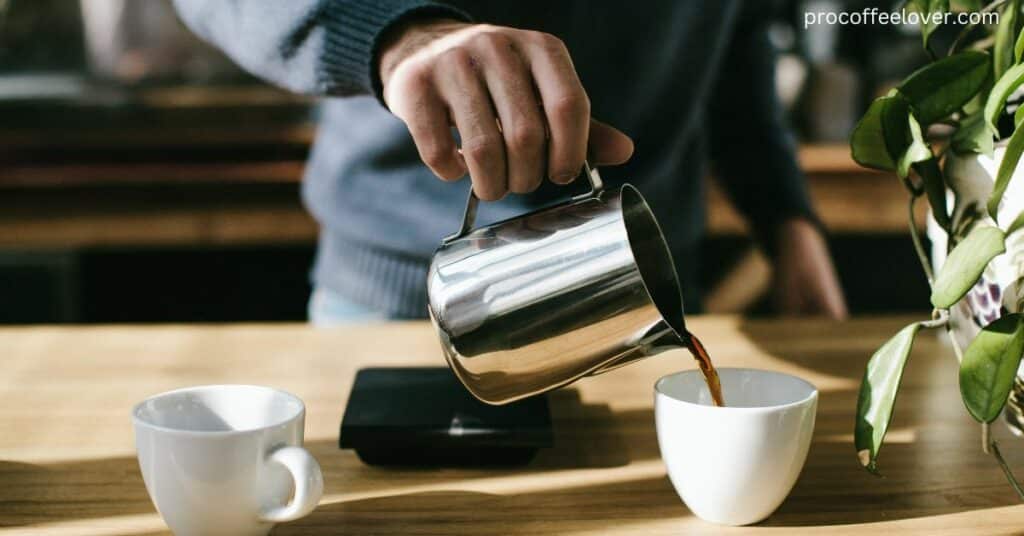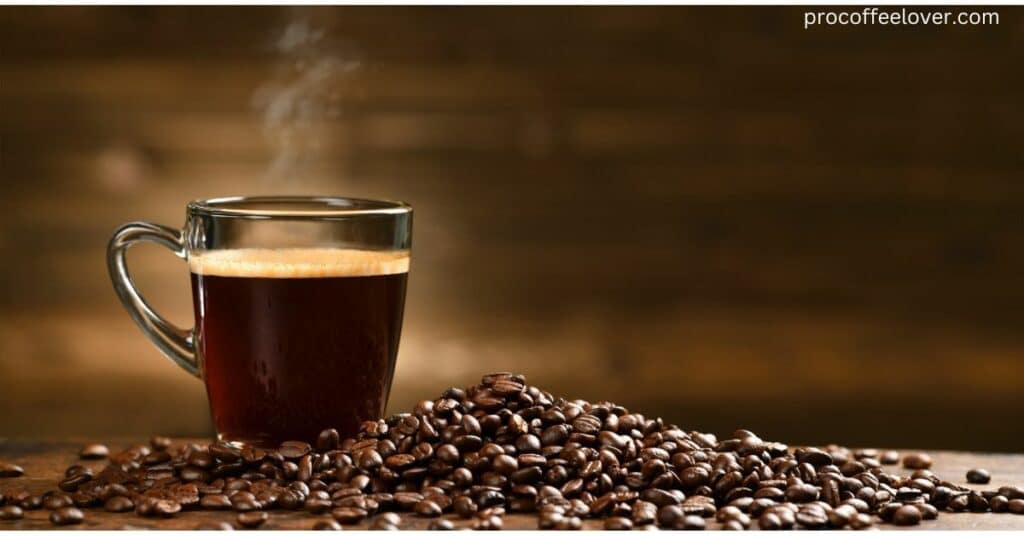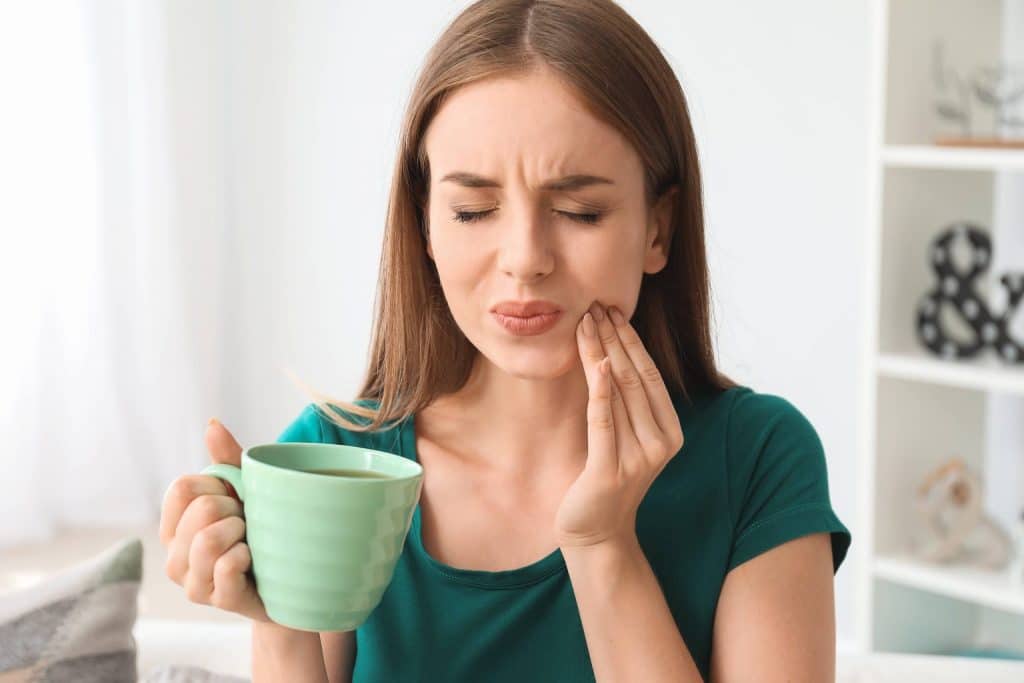Today we will discuss can i drink room temperature coffee after tooth extraction.It’s a coffee addict’s nightmare, the inability to drink a tremendous and enjoyable cup of coffee on medical orders! After tooth extraction, coffee can be consumed as long as the patient has not undergone any significant dental procedures.
I am basing this article on my experience after removing my wisdom teeth. This article provides a personal opinion on when to drink coffee after tooth extraction. It advises consulting a dentist for medical advice and discussing the permissible time to consume hot beverages.
After tooth extraction, a blood clot forms at the missing tooth’s site, which is crucial for healing. However, coffee can prevent this clot from forming or disturb it, causing a painful dry socket. Although treatable, it’s unpleasant and can slow healing time, making it a significant issue to avoid.
The Disruptive Effects Of Coffee On The Healing Process

Once your teeth have been extracted by a dentist, a blood clot will form over the socket where the tooth once was. In addition to shielding the socket from germs and infection, the blood clot supports healing.
After having a tooth extracted, drinking hot coffee increases your risk of dislodging a blood clot, preventing one from developing, and experiencing the misery of a dry socket, which will cause you to experience severe oral pain.
You should abstain from consuming a cup of your favorite coffee or other hot drinks for a week to prevent developing that excruciating condition and speed up healing.Also,see more about how much caffeine in Folgers instant coffee.
Promoting Healing: A Guide To Quick Recovery
Food is a critical factor in your recovery. There are several more actions you should take to facilitate a speedy recovery. You should:
● Use caution and avoid anything that can obstruct healing
● Steer clear of alcohol, smoke, and forceful rinsing.
● Use no straws for a full day.
● After 24 hours, gently rinse with warm salt water.
● To reduce swelling, use an ice pack or a cool towel.
● Regularly brush and floss, but stay away from the extraction region.
● Take all prescription drugs precisely as advised.
Can I Drink Room Temperature Coffee After Tooth Extraction
Our civilization runs on coffee and gasoline, with the former tasting much like the latter. Edward Abbey said that if you’re a serious coffee drinker, keeping you away from a hot, steaming cup of coffee for a long time may be challenging.
You’ll surely grab one on the move, whether it’s a latte, espresso, red-eye, cappuccino, or mocha. On the contrary, if you have recently had a tooth extracted, keep asking yourself, “Can I drink coffee after tooth extraction?” The apparent “No” response is then.
It is advised to refrain from drinking coffee for a few days and give the therapy some time to take effect to prevent toothaches. Decaffeinated coffee should be consumed after five days, and the mouth should heal after 14 days.
You must immediately tell your dentist if you feel discomfort or pronounced pain. Despite this, many things to watch out for will be covered in this article to prevent tooth discomfort.Also, see more about What Makes A Poor Guy Drink Coffee?.
Coffee After Wisdom Teeth Removal: Forbidden Or Permitted?
After removing your wisdom teeth, you can drink coffee, but you should be aware of why it might not be the most fantastic beverage for healing. In other words, you can physically consume the coffee after that, but doing so too quickly can have unfavorable repercussions.
Coffee’s acidity can interfere with blood coagulation, slow wound healing, and increase continuous bleeding. Hence, it is advised to drink it until the following day after wisdom teeth removal. Coffee use could be the cause of any bleeding that continues. It is recommended to hold off until the next day to prevent issues.
Why Does Coffee’s Acidity Prevent Blood Clots From Forming?
Studies have shown that a modest rise in acidity, such as a pH fall of 0.4, can lengthen the time it takes for blood to clot and weaken it by 25%. By lowering the pH in its range from 7.4 to 7.0, the efficacy is reduced by 25%. Black coffee has an approximate pH of 5. Coffee’s acidic pH with milk is about 6.
The acidity of coffee will prevent the blood from clotting while the cut is healing, whether or not milk is added. The impact would reduce Blood clotting effectiveness by more than 25%.
In light of this, our dentists advise that you hold off on drinking your coffee for at least a day because the bleeding should have ceased primarily by then.
Coffee can interfere with the healing process of a wound; therefore, if you are going to get your teeth pulled, you should have had your cup before the treatment.
How Soon Following a Tooth Extraction, Can I Drink Cold Brew Coffee?

Within the first 24 to 48 hours after tooth extraction, avoiding all coffee beverages, including hot coffee, cold coffee, black coffee, and any coffee with or without sugar, is advised. A coffee at room temperature is likely okay.
However, we advise checking and confirming with your dentist first. I’m a coffee freak and love drinking coffee, often just for the sake of it and the pure enjoyment of the taste.
I do this to cleanse my taste receptors and enjoy the flavor more when I return to my regular coffee habits, which might be a few days, a week, or even a few weeks.
Try it; consider it a taste-bud cleanse or refreshment.
AVOIDING HOT COFFEE AFTER TOOTH EXTRACTION FOR THE FOLLOWING REASONS:
To be on the safe side, you must avoid any hot beverage, especially a cup of refreshingly warm coffee. The main reason to avoid drinking hot coffee during that time is because the nerve endings become more susceptible.
Moreover, exposure to extreme heat during that time might result in agonizing aching and severe nerve pain.A cup of hot coffee can also prevent a blood clot from forming over the affected area or entirely remove it if one has already begun. This goes beyond simply causing tooth discomfort.
Another name for this blood-clotting issue is dry sockets. Call your dentist immediately if you are experiencing this problem following tooth extraction, since only a qualified dentist can resolve it.
After severe tooth extraction, caffeine scalding coffee is strictly prohibited for at least 24–48 hours. Expert dentists advise against this as it can dissolve clots and hinder healing.
Additionally, coffee can increase the risk of developing a dry socket, which is the inability of the wound to form a blood clot before healing, which is crucial for recovery.
Therefore, avoiding coffee consumption during the initial 24 hours of extraction is essential. In cases of mild tooth erosion, avoiding coffee for the first 48 hours is advised. However, coffee addicts may still enjoy their favorite coffee.
“Cold Coffee” is an ideal option for those with low caffeine intake, making it an outstanding post-surgery coffee. However, it’s crucial not to overdrink it.
Alternative Beverages After An Extration:

Hydration is crucial for healing and preventing dry sockets after minor oral surgery. Drinking plenty of water is recommended to stay hydrated and cleanse the extraction site. Milk is a nutritious option containing calcium and is essential for tooth strengthening.
Non-carbonated sports drinks are popular for hydration but have high sugar levels, making them a risk for post-surgery bleeding. Smoothies are a popular choice for the younger generation, containing vitamins and nutrients essential for the body.
However, be cautious of fruits with tiny seeds, such as blackberries and strawberries, as they can get stuck in the gums and cause complications.
It is essential to avoid consuming coffee immediately after oral surgery and instead opt for non-carbonated sports drinks or smoothies for a more balanced diet.
Is It safe To Consume Tea And Coffee After Undergoing A Tooth extraction Procedure?
Tooth extraction is performed if there is decay or injury to the tooth and damage to the tooth. Hot drinks and hard foods should be avoided as it takes 24 hours for the wound to form a layer and the injury to heal within 24 hours.
Hot and harrowing foods delay wound healing. So, after 24 hours, you can drink tea and coffee, but you can also drink warm coffee or tea if you wish. It’s better to avoid than to accept.
Can I Drink Beer Four days After tooth extraction?
Time:
Regarding editing, there is no specific model to compare, only a rough estimate.The speed of treatment varies from person to person and depends on many factors, such as age and pre-existing conditions, especially diabetes, anemia, etc.
Other local factors such as oral hygiene, extraction difficulty, and tooth type also have an impact.In general, it is recommended to cleanse the treatment area from alcohol before tooth extraction. It usually takes from 10 days to 2 weeks.
Even if the person is healthy, drinking alcohol four days after tooth extraction will not cause harm if the person does not use antibiotics. Some antibiotics, such as metronidazole, can interact with alcohol, causing side effects such as nausea, vomiting, diarrhea, and vomiting.
Is It safe To Consume Iced Coffee Following A Tooth Extraction?
After tooth extraction, you will receive the following instructions: Avoid hot drinks or food daily. This includes things you can eat cold, including iced coffee.
The cooling product will not interfere with the formation of blood vessels in the socket, thus preventing the socket from drying out. Hope you’re enjoying your iced coffee now
Summary:
Finally we learned can i drink room temperature coffee after tooth extraction.The dentists advise waiting until the following morning for coffee, as the bleeding should have stopped mainly by then. They also advise not to drink acidic drinks with a straw, alcohol, sodas, diet sodas, and sparkling water.
Coffee can be had before the appointment as long as the patient is not sedated for the procedure.
